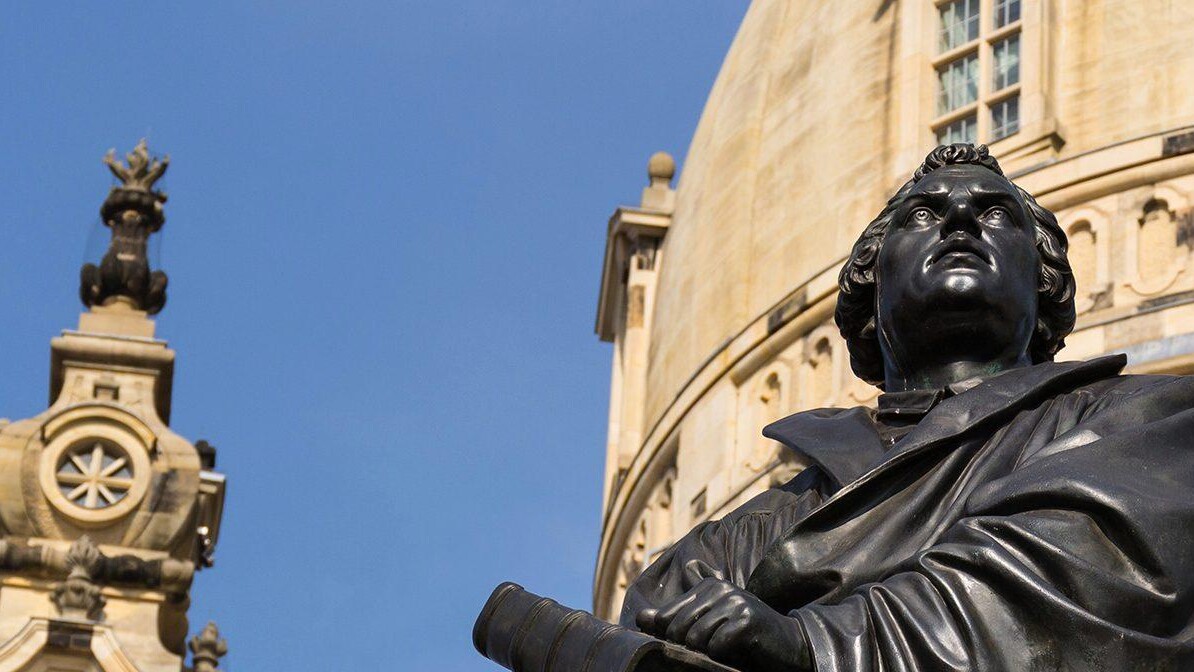- Home
- Spiritual Life
- Godspeed: The Reformation Speaks Today

Godspeed: The Reformation Speaks Today
Craig von Buseck: I’ve read your books Majestie about the reign of King James and his famous Bible; Tyndale: The Man who Gave God and English Voice; and Discovering Your Spiritual Center. I loved them all. Tell me about your latest book, Godspeed: Voices of the Reformation. You have become an expert on the Reformation.
David: I wouldn’t say expert. Enthusiast for sure. I’m always looking for things that are relevant, and I kind of backed into the Tyndale book.
CVB: Tell me how that happened.
David: I had pitched a novel to Thomas Nelson, and while they liked it, the acquisitions editor said they were looking for someone to do a biography on King James. I said, “Give me a shot!” So within two months I had a two-book deal. So one of the chapters in the King James book was about William Tyndale and John Wycliffe. I thought I’d do a twin biography of these two men, because they were the first to do English translations of the Bible.
Wycliffe’s version was based on the Latin Vulgate, so it had a lot of holes in it. It’s nearly unreadable for most people today. Whereas Tyndale was the first to translate the Bible into English using the original Greek and Hebrew.
CVB: He was courageous off the charts.
David: Yeah. He said to a group of bishops, “I defy the Pope and his laws, and if God grant me life, I’ll see that the boy driving the plow knows more Scripture than you do.” He was a nuisance to those guys. So he left England to do the translation of the Bible in relative safety. He was a brilliant man. He spoke eight languages and attended Oxford. He had both a bachelor’s and master’s degree, and that was a big deal back then.
I felt a connection with Tyndale, so I called the publisher and said, “I’m just smitten with this guy.” And he said, “Well, do it. Go for it.” I responded, “Well, I’ve never done a biography before. What if it sounds like a novel.” He said, “That’s exactly what we want. We want it to be very readable.”
Lyrical Writing and King James
CVB: David, your writing is lyrical. There were times where I would be sitting in my bed at night reading Majestie and I would laugh and say out loud, “I love this book!” It was almost like you were a personal friend of King James – as if you knew him.
David: I felt like I knew him. One day I was editing Majestie and I love that part of the process. I love both the writing and the editing, but it is in the editing where the book really starts taking shape. In that particular time I walked out of my office with tears streaming down my face. My wife saw me and was concerned. “What happened?” she asked.
“You’ll think I’m crazy. I’ve been writing about this king, who was just a kid, and it’s breaking my heart.”
James’ father was murdered when he was 6 months old. His mother was taken away from him when he was 11 months old. He was crowned king at 13 months old. He was kidnapped nine times before he became a teenager. People saw the crown, but they didn’t see that he was still a child.
As much as I identified with Tyndale, I also identified with James. He was brilliant. One modern writer considered him to be ADHD, so he could do several things at one time. He could quote long passages of Scripture – sometimes whole chapters in French, English, and even Latin. Then he would cuss like a tavern keeper in Parliament. He had these wide contradictions.
Back in the 1990s, I connected with Shakespeare. I started going to plays and listening to his writing. Shakespeare’s was a listening culture. That started me on a quest to absorb all of Shakespeare. I could tell you the opening lines of all the plays. So by the time I got the deal for Majestie, I was absorbed by the latter part of the Sixteenth Century.
When it was all over, I felt that it was one of those things I was meant to do. That is particularly true with Tyndale. I tried to do the same thing with Tyndale that I did with Majestie – which was a book that was allowed to laugh. You can hear me laughing in the background in Majestie. The academic writer may not be able to do this – but I thought about writing a book where the writing itself reflect the lyricism of the age. And I think it did.
Godspeed and the Reformation
CVB: I teach at writer’s conferences and I’ve said many times, if you want to read a great writer, read David Teems. So this brings us back to Godspeed.
David: Godspeed is a 365-day devotional that features the Reformers, both men and women. At that time, women were fairly voiceless. I feature Catherine Parr quite a bit. She was Henry the Eighth’s sixth wife, and she was quite a lyrical writer. She wrote several devotionals, many about the Psalms.
Tyndale and Luther take the main stage in this book, of course. But I also include John Calvin, John Knox, Jan Hus, and John Wycliffe. I call Wycliffe “the Luther before Luther” – as he lived 130 years before Luther’s time. The Reformation, for me, has its beginnings in John Wycliffe. The attitude concerning reform in the church may have been growing and growing, but Wycliffe was the first one to write about it. He was the first willing to debate about it. Had he not died of a stroke, he would have been burned at the stake for his troubles.
CVB: Well they dug him up and burned his bones, just to make sure, right?
David: That’s how ridiculous it was. He was declared a heretic by the Roman Church in 1415, then at the order of the Pope, they dug him up to burn him in 1428. When someone was made a priest, they anointed him, so they scraped his bones to remove that anointing. They paraded him around the town of Lutterworth in England, and then burned him at the stake. The sheriff took a mattock to make sure the bones were completely crushed, and then threw his ashes into the River Swift.
CVB: If it weren’t for the German princes, Luther may have likely suffered the same fate.
David: Now Luther had advantages that Tyndale did not have.
CVB: The printing press for one.
David: Yes. He also had a wife and the protection of his prince. He had the university. Tyndale, on the other hand, was on his own. That’s what I love about Tyndale – his entire focus in life was the translation of the Bible into English. We would not be speaking the same English without William Tyndale.
CVB: That was a fascinating point that you made in the “Tyndale” book.
David: And everything I say in the Tyndale book, I have sources to back it up. But with Godspeed, each day I present one of the writings of the Reformers. I include a quote from the Reformer, and then there is a commentary from either the original writer or myself. I add a prayer, a historical note, and a related Scripture at the bottom of the page.
So whoever reads this gets a good taste of the Reformation. But the most important thing I can say about this book is that the Reformers are relevant to today’s culture. William Tyndale exercised, as he said, a Christ-like indifference to politics. He felt that it’s an investment of faith. That’s particularly true in these days where you don’t know who to believe.
…
Order your copy of Godspeed by David Teems.
Trending Now
Sign up today for your Inspiration Today Daily Newsletter
Supercharge your faith and ignite your spirit. Find hope in God’s word. Receive your Inspiration Today newsletter now!
Dr. Craig von Buseck
Dr. Craig von Buseck is an award-winning author. Learn more at vonbuseck.com
Related Articles
April 16, 2024
How Deep Is Your Faith?
By God’s Word, He promises to give us wisdom and revelation of what our relationship with Him…
April 16, 2024
The Whisper of God’s Spirit
The Bible says, “Live by following the Spirit” (Galatians 5:16) and, “The true children of God are…
April 16, 2024
Power to Break Every Chain
The early church didn’t have the technology we have. They didn’t have computers, smartphones, or…
Next Steps To Strengthen Your Walk
Submit A Prayer Request
We are here for you. Simply click on the button below to reach us by form, email or phone. Together we will lift our hearts and voices with you in prayer.
Partner WIth Us
Sow a seed of faith today! Your generous gift will help us impact others for Christ through our global salvation outreach and other faith based initiatives.
Inspiration TV
Watch Christian content from your favorite pastors, christian movies, TV shows and more.






